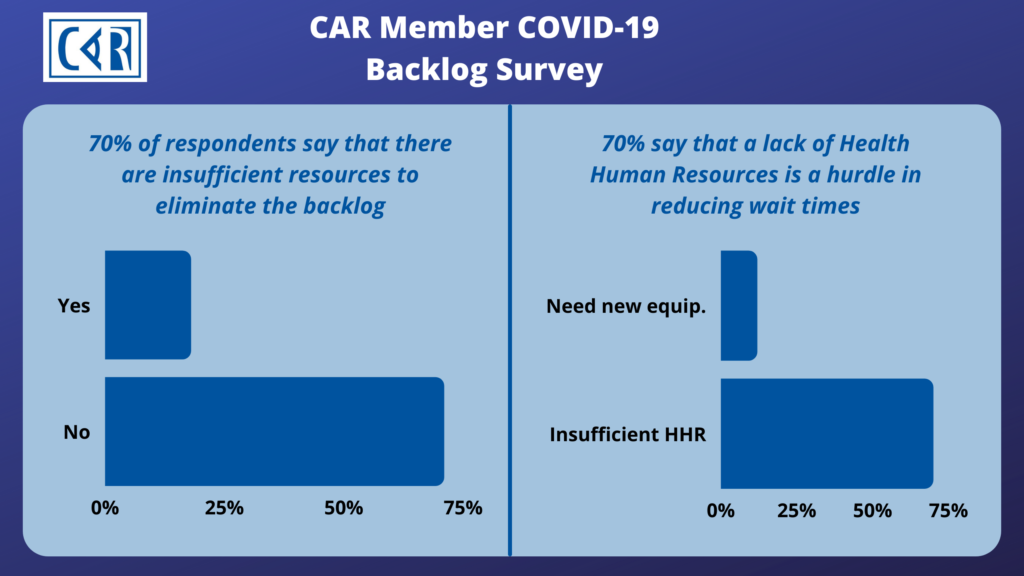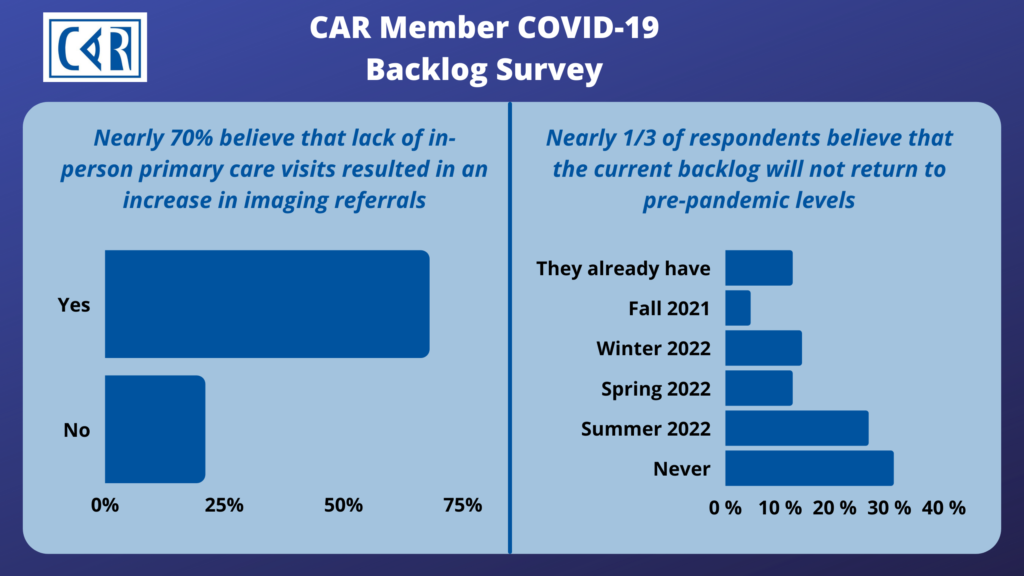The pandemic has had a significant impact on wait times for medical imaging across the country. For the last 20 months many Canadians have been waiting to receive these potentially lifesaving procedures. The radiology community has been working hard to try and manage the existing backlog while trying to carry out imaging procedures for new patients. Prior to the pandemic, wait times for medical imaging were way beyond the acceptable 30-day standard, resulting in patients waiting up to 89 days for an MRI and 82 days for a CT. With the onset of the pandemic, the situation has been further exacerbated forcing patients to wait even longer. This has led in some cases to a decline in patient’s conditions and many diseases going undiagnosed or treated. In an effort to capture an assessment of the current wait times for medical imaging in Canada, the CAR conducted a survey of its members. Included below is a summary of the results as well as some a description of how the current situation is affecting the radiology community.
The Patient Impact
Patients across the country are waiting for medical imaging. When we surveyed our members, they indicated that there were many factors that influence the timely delivery of care. Many radiologists believe that wait times will never return to normal without change.


What Does this Mean for the Radiology Community?
We asked our members to describe the current situation for medical imaging and to share their experiences working in a pandemic environment. This is what they had to say:
- All cases are now deemed urgent due to the pandemic, and it is hard to accommodate.
- A high number of missed diagnoses are causing a heavy burden on mental health of clinicians & radiologists.
- A shortage of techs and nurses is limiting the ability to provide adequate services for patients
- High instances of burnout and stress from radiologists and other staff working around the clock.
- Loss of morale from inability to keep up with the demand.
- New equipment is needed to work more efficiently – older equipment is much less functional and takes longer to perform scans.
- There is a lot of repetition in scans being performed for the same patient from numerous specialists.
Where Do We Go from Here?
Now is the Time to Act. The current framework for medical imaging is not sustainable and things are only going to get worse. Included below is a set of recommendations from the CAR to help deal with the substantial backlogs for medical imaging in Canada.
- We need to invest in new medical imaging equipment and health human resources to deal with the increasing wait lists.
- We need to use innovative technologies such as Artificial Intelligence to broaden the scope of the radiologist.
- We need to implement a system for electronic referrals to ensure that referring health practitioners are ordering the right tests at the right time for patients, minimizing repetition.
We need the federal government to take a leadership role on these priorities so that Canadians can access the best imaging care possible, reducing the wait lists and improving health outcomes.
Get Involved – Join the POP
The CAR is inviting members from across the country to join our Parliamentary Outreach Program (POP). We are seeking representatives to become involved in grass roots advocacy to support our national efforts. Sharing examples firsthand of your challenges in delivering optimal patient care can have a significant impact and help to garner support from your local Member of Parliament (MP).
“As radiologists, we have a responsibility to be community leaders and to represent our patients at the regional level. Better access to medical imaging through increased equipment, more health human resources, and the implementation of innovation, will improve patient outcomes and result in significant cost savings to the economy at large. Coming out of a global pandemic, now more than ever we need to step up and take action. Meet with your MPs, advocate within your institutions and speak to the value of radiology in healthcare. United, we are stronger.” – Dr. Mike Barry, Past-President, CAR
